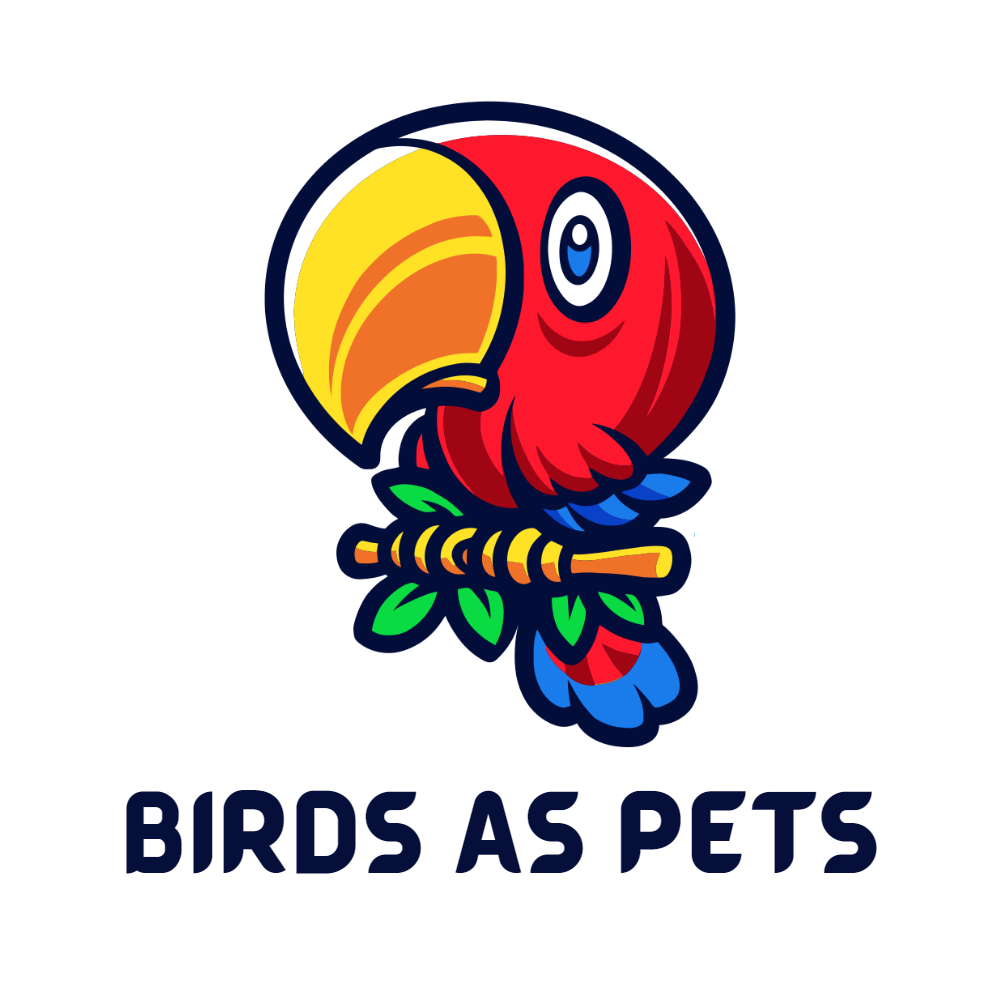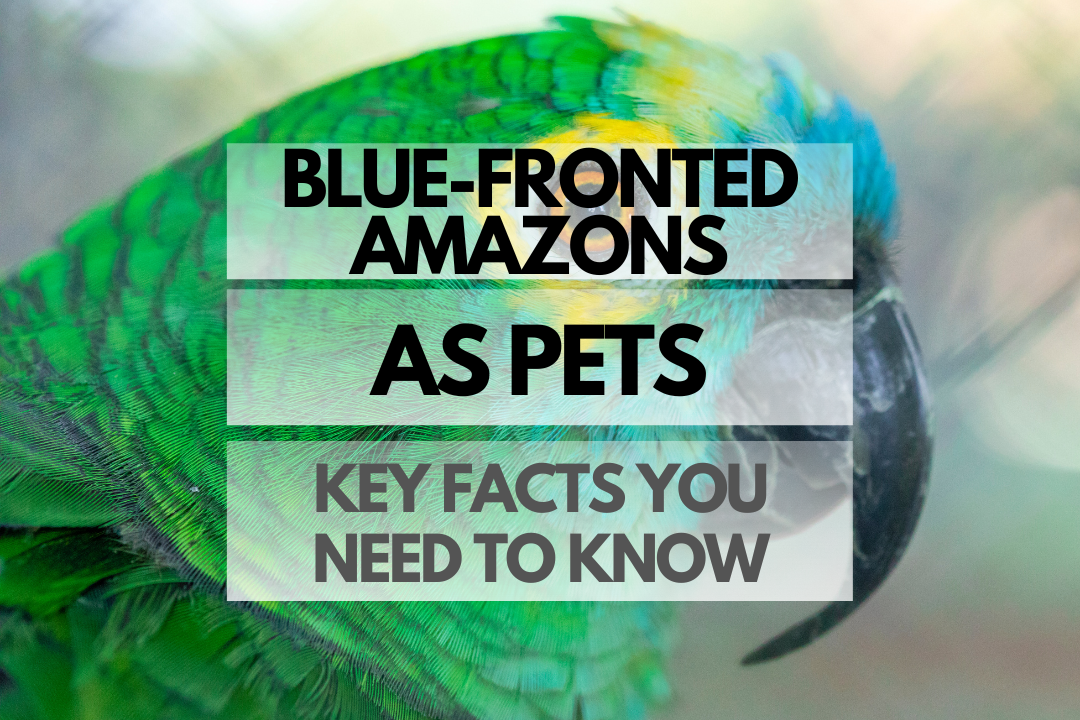If you’re considering a Blue-fronted Amazon as a pet, you’re in for a rewarding and entertaining experience. These intelligent and social birds make fantastic companions for the right owner. In this article, we’ll cover everything you need to know about Blue-fronted Amazons, from their natural habitat to their lifespan, and how to properly care for them.
Quick Reference Table: Blue-fronted Amazon Facts
| Fact | Description |
|---|---|
| Scientific Name | Amazona aestiva |
| Size | 14-15 inches (35-38 cm) |
| Weight | 9-18 oz (250-500 g) |
| Lifespan | 40-60 years |
| Color | Primarily green with a blue forehead, yellow cheeks, and red on the wings |
| Talking Ability | Excellent; known for their ability to mimic speech and sounds |
Where Do Wild Blue-fronted Amazons Live?
Wild Blue-fronted Amazons are native to South America, with their range extending across Brazil, Bolivia, Paraguay, and Argentina. They inhabit a variety of habitats, including tropical rainforests, savannas, and woodlands. These social birds are typically found in flocks and are known for their loud calls and playful behavior.
Blue-fronted Amazon Lifespan: How Long Do They Live as Pets?
Blue-fronted Amazons are known for their long lifespans, often living up to 40-60 years in captivity with proper care. This longevity means that owning a Blue-fronted Amazon is a significant time commitment, and potential owners should be prepared to care for their bird throughout its entire life. It’s essential to provide a balanced diet, regular veterinary care, and mental stimulation to ensure a long and healthy life for your Blue-fronted Amazon.
Are Blue-fronted Amazons Good Pets?
Blue-fronted Amazons can make excellent pets for the right owner. They are known for their intelligence, strong personalities, and exceptional talking abilities. These birds are social creatures who enjoy being around their human family members and can form strong bonds with their caregivers. However, they can also be demanding and require a significant amount of attention and mental stimulation. Potential owners should carefully consider their lifestyle and the long-term commitment required before bringing a Blue-fronted Amazon into their home.
Are Blue-fronted Amazons as Pets Good for Beginners?
Blue-fronted Amazons may not be the best choice for first-time bird owners due to their demanding personalities and long lifespans. They require consistent social interaction, mental stimulation, and hands-on care. Potential owners should have experience with birds or be willing to invest the time and effort to learn about proper care and handling before bringing a Blue-fronted Amazon into their home.
Are Blue-fronted Amazons Easy to Care For?
While no bird is truly easy to care for, Blue-fronted Amazons are relatively hardy and adaptable. They require a balanced diet, a large and secure cage, regular mental stimulation, and consistent social interaction. With proper care, they can be healthy and happy pets, but it’s essential to understand and be prepared to meet their specific needs.
Blue-fronted Amazon Pros and Cons
| Pros | Cons |
|---|---|
| Intelligent and social | Can be demanding |
| Exceptional talking ability | May be loud and vocal |
| Long lifespan | Requires a significant time commitment |
| Adaptable and hardy | Not ideal for first-time bird owners |
Blue-fronted Amazon Price and Costs
Blue-fronted Amazons typically cost between $1,000 and $3,000, depending on factors such as age, gender, and source. In addition to the initial price of the bird, you’ll need to account for the costs of a large cage, toys, perches, food, and ongoing veterinary care. The initial setup costs can be several hundred dollars, and ongoing expenses will vary depending on the specific needs of your bird.
Where to Buy Blue-fronted Amazons
You can purchase a Blue-fronted Amazon from reputable breeders, pet stores, or avian rescues. It’s essential to do your research and choose a responsible source to ensure that you’re getting a healthy bird. Look for a seller who provides detailed information about the bird’s health, history, and care, and be prepared to ask questions about their breeding and care practices.
Caring for Blue-fronted Amazons
Proper care for a Blue-fronted Amazon involves providing a balanced diet, a large and secure cage, mental stimulation, and regular social interaction. Let’s explore these aspects in more detail.
Blue-fronted Amazon Food
A balanced diet for a Blue-fronted Amazon includes a mix of high-quality pellets, fresh fruits and vegetables, and occasional seeds and nuts. It’s essential to avoid feeding your bird an all-seed diet, as this can lead to health problems. Blue-fronted Amazons have specific nutritional requirements, so consult with an avian veterinarian to ensure that your bird’s diet is appropriate and balanced.
Health and Common Issues
Blue-fronted Amazons are generally healthy birds, but they can be susceptible to certain health issues, such as obesity, respiratory infections, and feather plucking. Regular veterinary care, a balanced diet, and proper mental stimulation can help to prevent or manage these issues. It’s essential to monitor your bird closely for any signs of illness and consult with an avian veterinarian if you have concerns about their health.
Signs of Healthy Blue-fronted Amazon vs. Sick One
| Healthy Blue-fronted Amazon | Sick Blue-fronted Amazon |
|---|---|
| Bright, clear eyes | Discharge or cloudiness in the eyes |
| Smooth, well-groomed feathers | Ruffled, plucked, or dirty feathers |
| Active, alert, and social | Lethargic, unresponsive, or withdrawn |
| Normal droppings | Changes in droppings, such as color, consistency, or frequency |
| Steady weight and appetite | Weight loss or changes in appetite |
| No signs of respiratory distress | Coughing, sneezing, or labored breathing |
Blue-fronted Amazons Pet Insurance
- Nationwide Pet Insurance
- Healthy Paws Pet Insurance
- PetPlan Insurance
- Embrace Pet Insurance
- Trupanion Pet Insurance
Personality and Behavior
Blue-fronted Amazons are known for their playful, affectionate, and intelligent personalities. They are curious and active birds that love to explore their environment and interact with their human caregivers. These birds are social creatures, often bonding strongly with one person in the household while still enjoying interaction with other family members. They can be territorial and may display possessive behaviors, so it’s essential to establish boundaries and provide them with their own space.
Are Blue-fronted Amazons Social?
Yes, Blue-fronted Amazons are social birds that thrive on interaction with their human family and other birds. They enjoy socializing, playing, and learning new tricks. However, they can be somewhat independent and may need time to themselves to explore, play, and rest. It’s crucial to provide a balance of social interaction and alone time to ensure a happy and well-adjusted bird.
Speech and Noise of Blue-fronted Amazons
Blue-fronted Amazons are known for their remarkable speech abilities and can mimic a wide range of sounds, including human speech, with impressive clarity. They enjoy practicing their vocalizations and engaging in conversations with their caregivers. However, they can also be quite noisy at times, especially when excited or seeking attention. Potential owners should be prepared for their vocal nature and consider whether their living situation can accommodate a sometimes loud pet.
Similar Species to Blue-fronted Amazons
- Yellow-headed Amazon (Amazona oratrix)
- Red-lored Amazon (Amazona autumnalis)
- Mealy Amazon (Amazona farinosa)
- Orange-winged Amazon (Amazona amazonica)
- Lilac-crowned Amazon (Amazona finschi)
Can Blue-fronted Amazons Live With Other Pets and Birds?
Blue-fronted Amazons can coexist with other pets and birds, but proper introductions and monitoring are essential. They may get along with other similarly sized birds but can be territorial and may not tolerate smaller birds. It’s crucial to supervise interactions between your Blue-fronted Amazon and other pets, ensuring that all animals have their own space and feel secure. Keep in mind that some pets, such as dogs and cats, may not be suitable companions for a Blue-fronted Amazon.
Are Blue-fronted Amazons Legal to Have as Pets?
Blue-fronted Amazons are generally legal to keep as pets in most countries and states. However, it’s essential to check local laws and regulations before bringing a Blue-fronted Amazon into your home. Some areas may require permits, while others may restrict or prohibit the ownership of certain exotic birds. It’s crucial to ensure you’re following all applicable laws and regulations to avoid any potential issues.
Additional Resources
- Book: “Amazon Parrots: A Complete Pet Owner’s Manual” by Werner Lantermann
- Forum: Avian Avenue (https://www.avianavenue.com/)
FAQ for Blue-fronted Amazons as Pets
Do Blue-fronted Amazons talk?
Yes, Blue-fronted Amazons are known for their ability to talk and mimic sounds. They can learn a variety of words and phrases and may engage in conversations with their caregivers.
Are Blue-fronted Amazons suitable for families with young kids?
Blue-fronted Amazons can be suitable for families with young kids, but it’s essential to teach children how to interact with the bird safely and respectfully. These birds can be territorial and may bite if they feel threatened, so proper supervision and education are crucialwhen introducing them to young children.
Can Blue-fronted Amazons be trained?
Yes, Blue-fronted Amazons are intelligent and can be trained to perform various tricks and behaviors. Positive reinforcement and patience are key when training these birds. Make sure to keep training sessions short and engaging to keep their interest.
How do I know what gender Blue-fronted Amazons are?
Determining the gender of a Blue-fronted Amazon can be challenging, as males and females look very similar. The most reliable method for sexing these birds is through DNA testing, which involves collecting a blood or feather sample and sending it to a laboratory for analysis.
What is the average lifespan of a Blue-fronted Amazon?
Blue-fronted Amazons can live for an average of 40 to 60 years, with some individuals living even longer. Providing a healthy diet, regular veterinary care, and a stimulating environment can help ensure a long, happy life for your bird.
What should I feed my Blue-fronted Amazon?
A balanced diet for a Blue-fronted Amazon should include a high-quality pellet, fresh fruits and vegetables, and a limited amount of seeds and nuts. Avoid feeding your bird high-fat or sugary foods and be cautious with human foods, as some can be toxic to birds.

